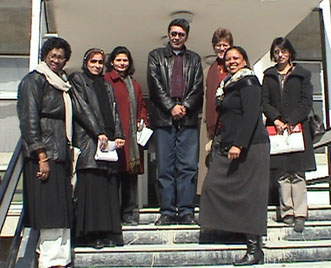 |
Saying their farewells on the steps of the Institution for Health Sciences in Kabul, Afghanistan, are from left: Rosaline Olade, Ph.D., associate professor, UNMC College of Nursing department of gerontology, psychology and community health; an unidentified IHS staff member; Rukhsana Rahmetulia, Afghani nurse midwife educated at Case Western Reserve University Medical School (Cleveland, Ohio); Dr. Polpaul, director of the Institution for Health Sciences; Sheila Ryan, Ph.D., professor, UNMC College of Nursing department of parent-child, administrative education and science; Valda Ford, director of Community and Multicultural Affairs; and Roya Sadrizadch, a representative of the World Health Organization. |
The group consisted of Ward Chambers, M.D., associate professor of cardiology and executive director of Community and Multicultural Affairs; Valda Ford, director of Community and Multicultural Affairs; Sheila Ryan, Ph.D, professor in the College of Nursing; and Rosaline Olade, Ph.D., associate professor in the College of Nursing.
Here, in her own words, Ford talks about the group’s mission and why it’s important for UNMC to be involved in the rebuilding effort. In Monday’s UNMC Today, Ford will share her observations and experiences in Kabul.
Why did the UNMC contingent go to Kabul?
We went to Kabul to investigate the possibility of developing a collaborative effort to improve the educational opportunities for health care providers in Afghanistan and most importantly to improve the status of women. During the Russian invasion and the Taliban era, health care in the country was negatively affected. During our visit we learned that health care curricula for all health care providers had not been revised in a quarter of a century. Because of war and oppression, women were not allowed to be educated and the state of nursing and mid-wifery (in particular) were affected most. As a result the infant and maternal mortality rates are now among the worst in the world.
On previous trips, Dr. Chambers noted the poor state of the hospitals. On his second trip he took a number of supplies and textbooks for the University Hospital. He also made rounds in the homes of Afghan people and has endeared himself as a person who does more than just talk.
What are we doing there?
We are working with the Ministry of Health and representatives from the Aga Khan University to review curricula for nursing, allied health, and Dr. Chambers has been asked to participate in curriculum review and revision for schools of medicine. We can be involved with training of teachers in allied health and nursing, as well as medicine.
Why is it important for us to be involved?
It is important for us to be involved for a number of reasons. We (UNO – Tom Goutierre and Abdul Rahim Yaseer) have been working in the country for years and have established a level of trust and commitment that is unmatched by the newly arriving “helping” organizations. We also have a rich history and expertise in working with underdeveloped countries through the work of Dr. Sheila Ryan in helping to improve the educational status of nurses and health care delivery (several of the “stan” countries – Uzbekistan, Khazikstan and Iraq). My role is to learn about the people of Afghanistan and help our staff/faculty to be more culturally sensitive to the needs of the Afghan people.